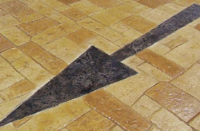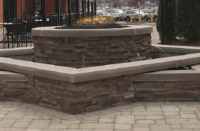Decorative concrete has become the fastest growing segment of the concrete industry. But in part because of this, the decorative market rarely allows individual contractors to effectively master and install each type of decorative concrete.
I could hardly believe my eyes. Their advertisement read that they did it all, every type of decorative concrete work. Stamping and stenciling, overlays and stains, concrete counters and polished concrete, sandblasting and etching, basement walls and foundations, and I almost forgot this part, no job too small. I have been in the decorative industry a long time, and I’m here to tell you the only things this guy didn’t do are body piercing and broken heart repair.
Don’t get me wrong — I am all for business expansion and introducing fresh applications into our decorative business, but if you are promoting your business like the one just described, there is a much easier way.
You see, staying busy and profitable is not about how many different decorative services you offer, but specializing in the types that are the best fit for you and your crew.
I completely understand how this guy got himself in the jack-of-all-trades predicament because I fell into the same trap myself. Tell me if this sounds familiar to you. We start out, let’s say, doing stained concrete. We run across a floor that isn’t stainworthy, and obviously the only answer is to overlay the floor to give us a new canvas. There is one problem — we don’t know how to overlay — but that is easy enough to fix. Everything is going along well until our next client loves their new stained floor so much they want concrete counters to match. Oh boy, here we go with another seminar and a plane ticket. By now you are probably getting my point.
Decorative concrete has become the fastest growing segment of the concrete industry. But in part because of this, the decorative market rarely allows individual contractors to effectively master and install each type of decorative concrete.
Decorative concrete roots have now spread in so many directions that it is nearly impossible to be good at everything. I can assure you it is not a good idea to try dollars-and-cents-wise for at least three reasons:
- It’s too confusing for you and your crew to switch back and forth from day to day. Try to limit your crew to two or three types of decorative work.
- It makes it more difficult to be efficient and competitive. Repetition is profitable. Crews can be creative yet repetitive from step to step.
- It’s extremely difficult to organize the necessary tools for every decorative trade. And not having the correct tools and products on-site is the kiss of death. You may have noticed that most decorative concrete is very time-sensitive and will not wait for us to run back to the shop.
Pick just a couple
A couple of years ago my crew and I realized we didn’t enjoy some types of decorative concrete as much as others. It just seemed that, as they say in NASCAR, we were running loose and sometimes out of control trying to be everything to everyone. We decided to streamline ourselves, offer just a couple of services and establish a referral network for the other decorative services we no longer covered. This was a little bumpy at first, because companies that we once competed against were now receiving our referrals. But our goal was to make sure our customers were being taken care of and not simply being passed along.
Here were a few of the benefits of doing this:
- Other contractors referred work to us that we specialized in and we did the same for them. Not only did both contracting parties benefit, but the customer received better service and quality.
- We were able to inventory more of the decorative products and colors we used a lot, as well as receive price breaks for bulk orders.
- Since all of our decorative specialties are built around placing concrete, we were able to purchase a volumetric mixer. Supplying our own concrete gave us greater control of pour times, mixes, water-cement ratios and so on. This also allowed us to save on material costs.
 Find your niche
Find your niche
What types of decorative work to specialize in will best be determined by a couple of things. My recommendation is to pick the kinds of jobs that come easiest for your crew and supply your business with the most profitability while still taking care of the customer. Not everyone wants to build a large company, and you may be the type that enjoys working with one person or two. In this case I would advise types of decorative work that are less sensitive to timing and require less labor.
When choosing specializations for your company, consider these issues too:
- What is the competition doing, or should I say, not doing?
- How much of an investment does the decorative niche involve? Concrete polishing machinery can be expensive to purchase, but that may limit the competition. Staining can be less expensive to take up but more competitive.
- Your region may have a short window for outdoor decorative work because of weather limitations. I would recommend specializing in at least two types of decorative concrete, including interior and exterior offerings.
Profitability
If your goal is to provide first-class decorative installations, then believe me in saying that profit will follow close behind. Specialization should create an increase in your bottom line the first year it’s implemented.
Here are a few things to try to help boost that bottom line:
- If staining is your thing, then I recommend establishing a maintenance program that is aggressive in marketing waxing to both your customers and your competitors. I have found most companies simply want to stain a project and move on to the next. This maintenance offering is not only good for your bottom line but assures your projects will always look top-notch for potential customers.
- If stamping or stencil work is your thing, I recommend establishing a person or two that specializes in nothing but resealing exterior concrete. This should be marketed to both your clients as well as your competition. My company started this a couple of years ago and instantly saw an increase in profit. Note: Be careful to test sealer compatibility if resealing competitors’ projects.
- If concrete counters are your choice, I recommend adding custom concrete molds. These molds are available for purchase and come in a number of styles. A good mold can be used for years and will simplify your counter fabrication. No reason to reinvent the wheel, so purchase molds that fit into your market.
- If your niche is custom concrete, like colored and rock salt finishes, then I recommend adding a volumetric truck to your business. This will not only give you more control but will allow you to sell concrete to homeowners and other contractors after your crew has poured out. Be sure to research aggregate inventories in your area to make sure they are available and affordable.
You may find yourself hesitant to surrender potential business by specializing and limiting services. I sure did, but the end result is more than worth it, if for no other reason than simplifying your day-to-day activities. It can be difficult to tell customers that you no longer offer a service, but a simple explanation usually works. I recommend working closely with your client during the hand-off to another contractor so everyone involved feels comfortable.
















